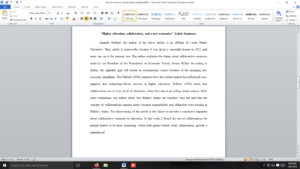Economics of Education.
Hello, Attached are the five Peer reviewed Journal Articles related to Economics of Education.
Please review the articles and summarize each article with 150 words each.
• The article presented first should be based upon alphabetical order of the article title.
I. “Christian ministry and theological education as instruments for economic survival in Africa” Article Summary
II. “Education as a Vehicle for Socio-Economic Change in Kenya” Article Summary
III. “Higher education, collaboration, and a new economics” Article Summary
IV. “Promoting low socio-economic participation in higher education: A comparison of area-based and individual measures” Article Summary
V. “Theological education and economic revitalization: Creating sustainable organizations through authentic engagement” Article Summary
Answer preview
Amanda Fulford, the author of the above article, is an affiliate of Leeds Trinity University. Their article is trustworthy because it was given a copyright license in 2015, and users can use it for personal use. The author evaluates the claims about collaborative commons made by the President of the Foundation on Economic Trends, Jeremy Rifkin. According to Rifkin, the capitalist grip will loosen in contemporary society because of the emerging new economic paradigms. The Fulford (2016) considers how the current market has influenced cost-negative and technology-driven services in higher education. Fulford (2016) states that collaborations are at every level of education, where they aim at providing certain outputs. After some evaluations, the author states that Rifkin’s claims are somehow true but said that the concept of collaborations remains messy because responsibility and obligation were missing in Rifkin’s claims.
[1109 Words]

Economics of Education.

